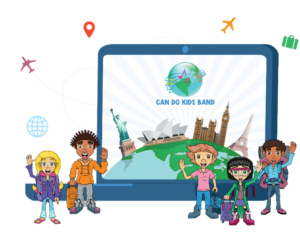Travel Education
- Helping Children To See The World -
By Dr Charles Margerison
Psychologist
Introduction
‘To travel is to live,’ wrote Hans Christian Andersen, the famous author.
It is also the way for students to learn about countries, cultures and communities.
Our mission is to help children aged between 6 and 14 years to learn about people and places in different parts of the world.
We do so by enabling young children to explore countries virtually together with the Can Do Kids Band.

We know from discussions with parents that they want their children to learn about countries and cultures for vacation travel as well as their general education.
An Online Innovative Approach
The Can Do Kids Band engages children at the primary and middle school levels. Their travel stories and videos cover the following countries:
USA – England – France – Australia – China – Spain – Germany
Canada – Brazil – India – Japan – South Africa
(In addition, there are educational resources available for another 28 countries)
Benefits
Our organization’s education team consults with parents on what they want for their children. A prime factor in all discussions is to support their children’s personal development and education. Vacation travel is an integral part of that.
The Can Do Kids Band resource is also used in schools to support Geography and Social Studies lessons. It helps students to appreciate different ways of life.
Comments from Educators
‘An engaging and innovative way of helping students learn about countries and communities.’
‘The students enjoyed the videos, which helped them participate in the group discussions.’
‘The website provides excellent information for students.’

Parental Views
‘My child enjoyed exploring different countries with the Can Do Kids Band.’
’I was surprised to see that my daughter followed the tour of the Can Do `kids Band for more than forty minutes without being distracted.’
‘The resource has helped me prepare our child for our forthcoming holiday.’
The Can Do Kids Band – Profile and Members
The motto of the band is ‘follow the music and learn about people and places.’
They represent the ‘can do and will do spirit’ of character education and promote respect for people from different lands.
Meet The Band

Ace is a skilled drummer from South Africa. He has relatives in the Caribbean where he learns new music techniques on his visits.
Amy is the energetic outgoing lead singer. She was born in California and now lives on the east coast of the USA.
Lin has a pitch perfect musical ear and hails from Beijing, China. She sparkles as she plays keyboard.
Ravi is from India and is the quiet bass guitarist. He enjoys cooking with new recipes that he gathers on his travels.
Oz is the versatile lead guitarist who enjoys outdoor adventures. He was born in England, and now lives in Australia.
In each country visited, they are hosted by students at local schools.
Classroom Application
Teachers have helped students to learn though discussions based on short 5 minute animated videos of various countries. The 45 – 60 minute lesson plans based on feedback from teachers include:
Introduction – 5 minutes – Educator indicates the country to be studied.
Video – 5 minutes – The video of the Can Do Kids Band visiting Australia, China, USA or one of the other countries is shown.
Group Discussions – 15 minutes – Students in groups of 4 to 6 discuss and share key points about the country, and identify why they are of interest.
Presentations – 15 minutes – Each group presents their key points through visual or verbal means.
Review – 10 minutes – Educator comments on the issues raised and allocates any project work required.
Learning from Travel
 The Can Do Kids Band are exemplars of the ‘can do spirit’. They help students to learn about countries around the world, and raise their knowledge and interest in travel.
The Can Do Kids Band are exemplars of the ‘can do spirit’. They help students to learn about countries around the world, and raise their knowledge and interest in travel.
In this way, students develop their language to communicate, not only with their teachers, but with their family and friends, about visiting countries in different parts of the world.
Summary
The Can Do Kids Band resource helps students to understand inclusiveness and diversity. In particular, the band encourages respect for cultural differences, and positive relationships between people.
The classroom discussions help students learn with and from each other about the people and places in each country.
The educational activities enable students to develop their enquiry and presentation skills, as well as encouraging an emotional interest in the countries they study.
The results show high levels of student engagement and learning.









